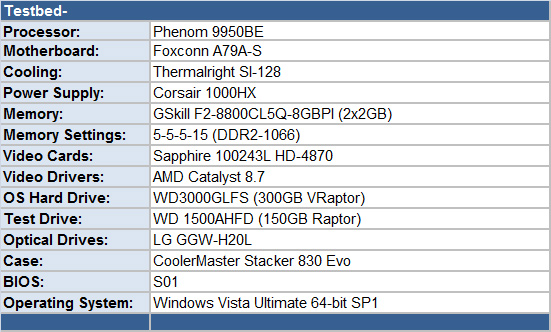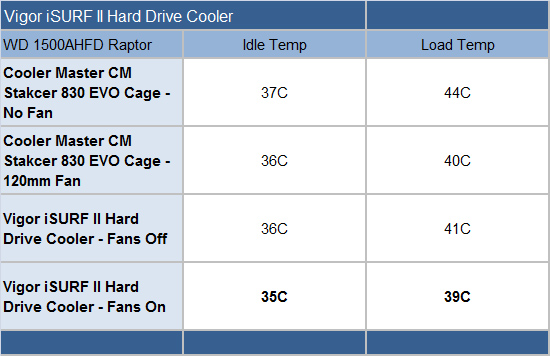Vigor iSURF II Hard Drive Cooling System - Keeping it Cool...
by Gary Key on July 31, 2008 6:30 PM EST- Posted in
- Storage
Test Setup-

We figured this particular setup would offer a generous amount of heat output in the case and it just happened to be the configuration we were testing in our Cooler Master Stacker 830 Evo case at the time. We performed our base test in the Evo's drive cage with and without the standard 120mm fan operating. We then removed the drive, installed it in our iSURF II hard drive cooling system, placed it in the bottom external 5.25" drive bay, and tested with the onboard fans in both an on/off state.
We performed our test scenario five times for each setup. We throw out the low and high scores and average the remaining three. We let the drives idle for 20 minutes for the idle results and then loop the PCMark Vantage HDD test suite three times for our load temperature results. We utilized both Active Smart 2.6 and HD Tune Pro 3.10 for our temperature readings. We also utilized a thermal sensor to ensure the results from the software applications were accurate. Our test room was kept at a constant 23 Degrees Celsius during the entire test routine.

The iSURF II out performs our 120mm drive cage fan slightly by offering a measured 1C drop in both the idle and load temperatures. While this may not seem like much, the actual temperature between the two installation points varied by 0.6C with the higher case temperature measured where the iSURF II was installed. Factoring in this difference, the unit offered a 1.6C improvement in temperatures.
What was most surprising is the result between the cage without the fan on and the iSURF II without its fans turned on. Our test unit offered a 1C advantage at idle and 3C during load operations indicating a robust thermal design by Vigor. We did not install rubber mounting grommets when we attached the iSURF II unit to the case, but acoustics did not differ from the isolated Evo drive cage in sound or tone.
We recommend the Vigor iSURF II Hard Drive Cooling system to those users needing to install an additional drive in an external bay based on the aesthetics and performance of this product. Of course, any Battlestar Galactica fans needing a Cylon theme will also benefit from the front bezel and blue LED design. In all seriousness, those users seeking improved hard drive thermals with case designs that do not offer hard drive cooling options will benefit the most from this product. For users in that particular situation, we would not hesitate to recommend spending $24.99 (or less) for the iSURF II. In fact, we already have for several test bed machines.










14 Comments
View All Comments
Slaimus - Friday, August 1, 2008 - link
CM makes two different 5.25 cages. I got the new aluminum one, and it may work better than the steel one that comes with the case.http://www.newegg.com/Product/Product.aspx?Item=N8...">http://www.newegg.com/Product/Product.aspx?Item=N8...
PAPutzback - Friday, August 1, 2008 - link
I think this artilce was just clips posted from random sites and made up numbers. I want proof.Bozo Galora - Friday, August 1, 2008 - link
Cool HDD fail quickerKeep em hot, fellas - lol
see section 3.4
http://research.google.com/archive/disk_failures.p...">http://research.google.com/archive/disk_failures.p...
Darkness Flame - Friday, August 1, 2008 - link
Think about it like this; in a lot of cases, the air coming into the system has to flow past the hard drives. Besides the fact that they are like bricks obstructing it, the outside air, usually between 20-30C, has to run past things that are 40+C. Both of those things might affect the temperatures of other air cooled devices in the case. If you could move the hard drive out of that path; whether cooled or not, you'd help the intake of cool air into the system. So, for cases that have a lot of exhaust fans and fewer intake fans, this might help them. However, it would only be a few degrees, but for air cooling, that can be a lot.araczynski - Friday, August 1, 2008 - link
all you naysayers need to shut up, you're instilling distrust in the consumer and ruining the financial success of my new inventions; the mouse cooler and keyboard cooler.guaranteed to get your frag count higher.
Dribble - Friday, August 1, 2008 - link
The load temps of your hd ranged from 39 to 44 degrees depending on cooling - well within the recommended range of most hds (which is 55 degrees).Q: What proof have you got that this is going to make the slightest bit of difference to your hard disk?
A: None because there is none because it probably makes no difference whatsoever.
bob4432 - Friday, August 1, 2008 - link
anybody know how speedfan info compares to what anandtech used in this article?Palamedes - Friday, August 1, 2008 - link
I tried to silence my HDDs some time ago and I've spent hours and hours finding the perfect solution. After all, I came up with two models, a HDD silencer by Scythe and a very simple, yet effective model for less than 20 EUR at my place, which has to be seen as a 30 US$-equivalent, even if that does not correspond to current exchange rates mathematically :)http://www.ichbinleise.de/Zubehoer/HDD-Zubehoer/HD...">http://www.ichbinleise.de/Zubehoer/HDD-...mmung/ic...
Believe it or not: this VERY, VERY simple thing quietened my drives completely and -most astounding- they now run cooler than before, even if you consider, that both drives are sandwiched between two foam plastic layers. It seems the metal contact at the sides cools them down to a max of 37°C, even if room temperature reaches up to 26°C.
Pyrokinetic - Friday, August 1, 2008 - link
I use the Zalman units on two 74GB raptors and the heatpipes do work quite well as they get noticably warm to the touch (I also applied some dots of Artic Silver 5 to the sides of the drive before mounting the coolers). I have a CM Stacker 810 with the hard drives and coolers mounted in a passive cooling configuration. My case has mesh bay covers, so the setup works with the airflow of my case. Works great with no noise -- perfect!Acanthus - Friday, August 1, 2008 - link
Say that fail rates for HDs dont change at all with temperature, and that temps dont alter reliability at all in the 1st place.In my humble opinion, this review is kind of moot and you'd be better off spending the extra $25 on a more reliable or better performing HD in the 1st place.